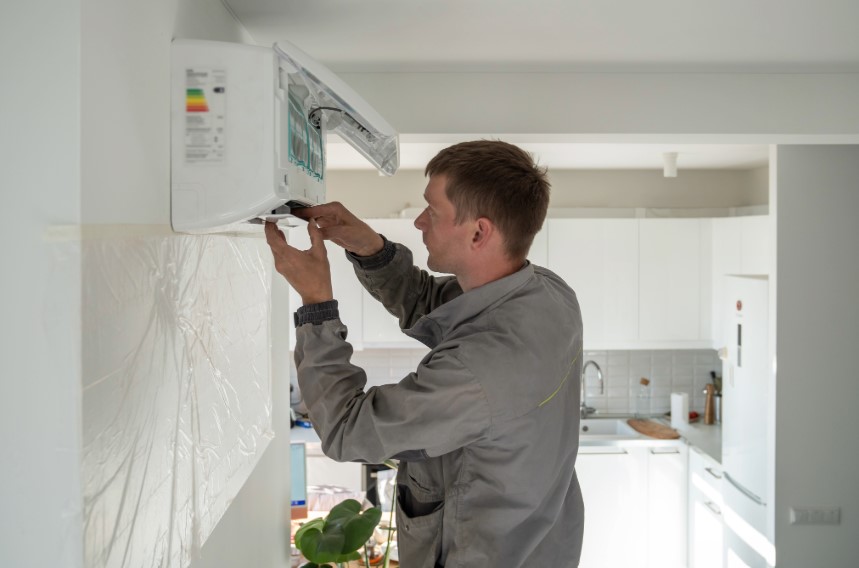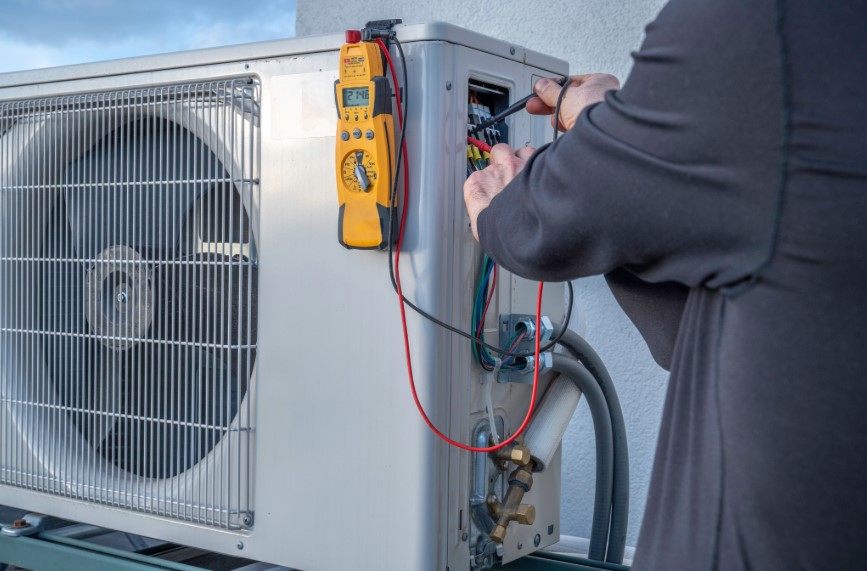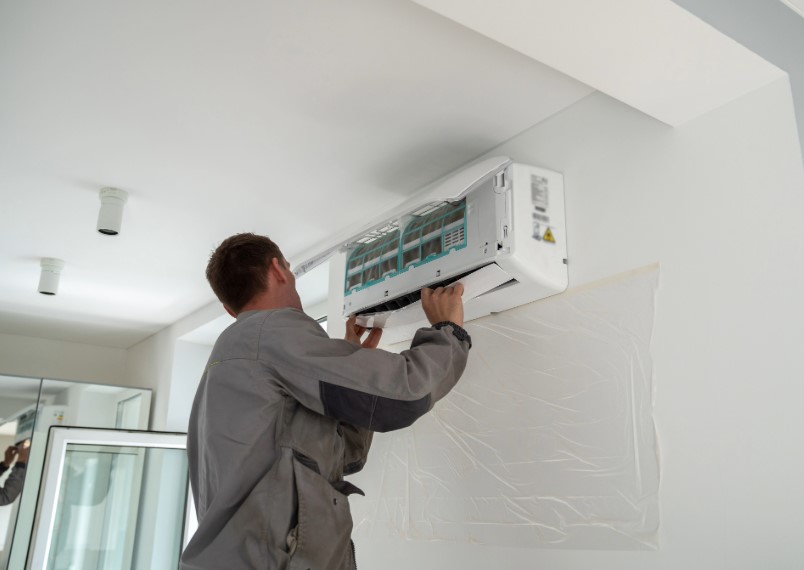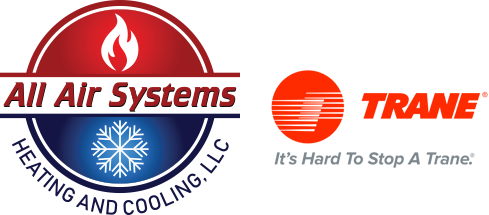
As the seasons change and our homes require a reliable source of heating and cooling, it’s important to know the evolving trends in HVAC technology. Nowhere is this more evident than in New Jersey, where homeowners are navigating a shifting landscape of energy solutions.
In recent years, there has been a noticeable transition away from traditional HVAC systems reliant on natural gas and fossil fuels. Instead, there’s a growing emphasis on renewable energy sources like wind and solar power. With New Jersey leading the charge towards a greener future, it’s no surprise that homeowners are seeking alternative heating and cooling options that align with these environmental goals.
Understanding Ductless Mini Splits: A Modern Solution for Modern Homes
Ductless mini split systems are seen as the heroes of modern HVAC technology. These innovative systems offer homeowners a versatile and efficient way to regulate indoor temperatures while minimizing their environmental footprint.
But what exactly are ductless mini splits, and how do they work? Unlike traditional HVAC setups, which rely on ductwork to distribute air throughout the home, ductless mini splits operate without the need for ducts. Instead, they consist of an outdoor compressor unit connected to one or more indoor air-handling units via a refrigerant line.
The advantages of ductless mini splits
They provide individual room temperature control, allowing homeowners to customize their comfort levels on a room-by-room basis. This not only enhances comfort but also promotes energy efficiency by avoiding unnecessary heating or cooling of unoccupied spaces.
Ease of installation is another key selling point of ductless mini splits. With minimal disruption to the home environment and no need for extensive ductwork, installation is typically quick and hassle-free. Plus, the compact size of indoor air-handling units makes them suitable for a wide range of settings, from single-room additions to multi-zone setups.
Perhaps most importantly, ductless mini splits operate solely on electrical power, eliminating the need for natural gas or fossil fuels. According to data from the U.S. Energy Information Administration, residential energy consumption in New Jersey has been steadily increasing, making the transition to electrical-powered HVAC systems all the more compelling.
By embracing ductless mini splits, homeowners can not only reduce their reliance on non-renewable energy sources but also contribute to the collective effort towards a more sustainable future. In the next section, we’ll delve deeper into the benefits of ductless mini splits and explore why they’re an attractive option for New Jersey homeowners looking to make the switch to greener HVAC solutions.
Exploring Heat Pumps: The All-in-One Solution
In our exploration of modern HVAC solutions, we come to a true jack-of-all-trades: the heat pump. With its unique functionality and versatility, the heat pump offers homeowners an all-in-one solution for year-round comfort.
Introduction to Heat Pump Systems
At its core, a heat pump operates on the principle of transferring heat from one location to another, rather than generating heat from a fuel source. During the winter months, it extracts heat from the outdoor air and transfers it indoors to provide warmth. Conversely, in the summer, it reverses this process to remove heat from the indoor air and expel it outside, effectively cooling the space.

Dual Functionality: Heating and Cooling
One of the most notable features of heat pumps is their ability to provide both heating and cooling capabilities from the same system. This dual functionality not only simplifies HVAC setup but also offers homeowners greater convenience and flexibility throughout the year.
Benefits of Heat Pumps
The benefits of heat pumps extend beyond their ability to provide year-round comfort. Their inherent energy efficiency can lead to significant cost savings on energy bills, particularly in regions with moderate climates like New Jersey. Additionally, by operating exclusively on electricity, heat pumps align seamlessly with New Jersey’s renewable energy goals, further reducing reliance on non-renewable fuel sources.
The Versatility of Ducted Mini Split Systems: Centralized Comfort Without Compromise
While ductless mini splits excel in providing targeted heating and cooling solutions, ducted mini split systems offer a more centralized approach to indoor comfort. Let’s explore the versatility and benefits of ducted mini splits.
Overview of Ducted Mini Split Systems
Ducted mini split systems, also known as central ducted systems, function similarly to traditional central HVAC systems but with a twist. Instead of relying on bulky ductwork, ducted mini splits utilize smaller, flexible ducts to distribute conditioned air throughout the home. This allows for more discreet installation and greater design flexibility.
Flexibility and Centralized Control
One of the key advantages of ducted mini splits is their ability to provide centralized heating and cooling while offering zoned temperature control. By dividing the home into separate zones, homeowners can customize comfort levels in each area according to their preferences, leading to enhanced energy efficiency and comfort.
Energy Efficiency and Environmental Benefits
Like ductless mini splits and heat pumps, ducted mini split systems operate solely on electricity, eliminating the need for natural gas or fossil fuels. This not only reduces greenhouse gas emissions but also aligns with New Jersey’s renewable energy objectives. Additionally, the efficient design of ducted mini split systems can further contribute to energy savings, making them an attractive option for environmentally conscious homeowners.
Why Choose Electrical-Powered Systems in New Jersey: Pioneering a Greener Future
As the Garden State charts a course towards a more sustainable future, the choice of HVAC systems plays a pivotal role in shaping our collective environmental impact. Here’s why electrical-powered systems, such as ductless mini splits, heat pumps, and ducted mini split systems, are leading the charge in New Jersey:

New Jersey Regulations and Policies
New Jersey has been at the forefront of implementing regulations and policies aimed at reducing reliance on natural gas appliances. With an increasing emphasis on renewable energy sources like wind and solar power, the state is paving the way for a cleaner, more sustainable energy future.
Importance of Renewable Energy
The shift towards renewable energy sources is not just a matter of environmental stewardship; it’s a necessity for combating climate change and ensuring a livable planet for future generations. By harnessing the power of wind and solar, we can significantly reduce our carbon footprint and mitigate the impacts of global warming.
Alignment with Renewable Energy Objectives
Ductless mini splits, heat pumps, and ducted mini split systems are uniquely positioned to align with New Jersey’s renewable energy objectives. By operating solely on electricity, these systems eliminate the need for natural gas or fossil fuels, thereby reducing greenhouse gas emissions and contributing to a cleaner, healthier environment.
Elevating Your Home Comfort: A Greener Tomorrow Starts Today
In a world where every choice we make has an impact, opting for electrical-powered HVAC systems is a tangible way to make a difference. By embracing ductless mini splits, heat pumps, and ducted mini split systems, homeowners in New Jersey can enjoy unparalleled comfort while championing a greener, more sustainable future.
Call 732-888-0952 or Contact Us for a New Jersey Mini Split HVAC Installation Quote
FAQ Section: Your Questions Answered
Q: Are heat pumps and mini splits based on the same technology? What is the difference between a heat pump and a mini split?
A: While heat pumps and mini splits share some similarities, they are not exactly the same. Both heat pumps and mini splits utilize heat transfer technology to provide heating and cooling. However, the main difference lies in their configuration and application.
- Heat Pumps: Heat pumps are standalone systems that provide both heating and cooling for an entire home. They typically consist of an outdoor unit connected to an indoor unit via ductwork. Heat pumps are often installed as central HVAC systems and can be used in conjunction with existing ductwork.
- Mini Splits: Mini splits, on the other hand, are ductless systems that consist of one or more indoor air-handling units connected to an outdoor compressor unit via a refrigerant line. They are ideal for individual rooms or zones within a home and offer greater flexibility in terms of installation and zoning options.
While both heat pumps and mini splits operate on the same basic principle of heat transfer, heat pumps are designed for whole-home heating and cooling, while mini splits are more versatile and suitable for targeted heating and cooling solutions.
Q: How do ducted mini split systems compare to traditional central HVAC systems?
A: Ducted mini split systems offer several advantages over traditional central HVAC systems. While both systems use ductwork to distribute conditioned air throughout the home, ducted mini splits typically require smaller, more flexible ducts, which allows for easier installation and greater design flexibility. Additionally, ducted mini splits offer zoned temperature control, allowing homeowners to customize comfort levels in different areas of the home, leading to increased energy efficiency and cost savings. Ducted mini split systems offer a modern, efficient alternative to traditional central HVAC systems.
Q: Are ductless mini splits suitable for every home?
A: While ductless mini splits offer many benefits, they may not be suitable for every home. Factors such as the layout and size of the home, as well as the homeowner’s heating and cooling needs, should be taken into consideration when determining whether ductless mini splits are the right choice. Additionally, installation requirements, such as available wall space for indoor units and access to outdoor areas for compressor units, may also impact suitability. Consulting with a qualified HVAC professional can help homeowners determine if ductless mini splits are a viable option for their home. Call us today.
